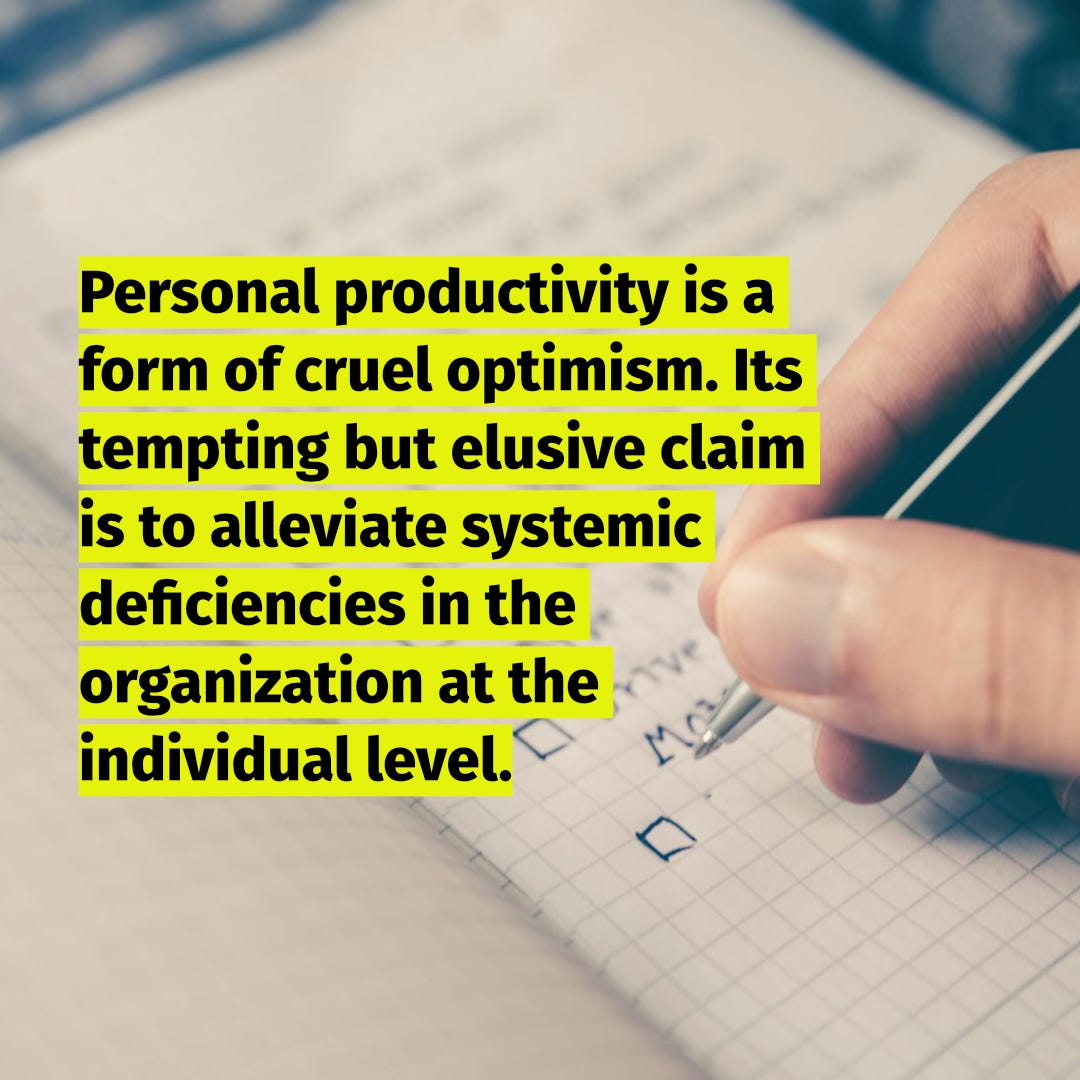Doing the Wrong Things Righter
Personal productivity is a form of cruel optimism. Its tempting but elusive claim is to alleviate systemic deficiencies in the organization at the individual level.
When Peter Drucker coined the term “knowledge work” in 1959, he noticed that because knowledge workers carry their means of production between their ears, the balance of power from the industrial age turns upside down. While the unskilled assembly line workers were dependent on the external means of production in the factory, the modern knowledge organization is dependent on the knowledge workers and their internal means of production. Knowledge workers are mobile, which gives them power.
Drucker rightly concluded (Drucker, 2011, p. 16): “Once beyond the apprentice stage, knowledge workers must know more about their job than their boss does--or else they are no good at all.” The relationship between boss and knowledge workers is now more akin to the interaction between conductor and orchestra (Drucker & Maciariello, 2008, p. 72). With it comes a high degree of individual autonomy in organizing one’s work.
This is where the problems began.
Taylorism was characterized by a clear separation of thinking and working: The manager defined and optimized the processes, and the worker then executed them. The low degree of autonomy for the individual worker was indeed not very motivating. Still, with the classic manager, at least someone was responsible for optimizing the processes end-to-end. With the autonomy of the knowledge worker, productivity became an individual matter. The field of personal productivity, which today fills many bookshelves and is the subject of many podcasts and articles, only makes sense against the backdrop of autonomous knowledge work.
Of course, it is not a mistake to get organized and get things done. On the contrary, good organization is a sign of professionalism and excellence. However, it also falls short if we treat productivity mainly as an individual matter without simultaneously working on the systemic causes over which the individual has little influence. In her book of the same name, historian Lauren Berlat coined the term “cruel optimism,” which Johann Hari describes as follows (Hari, 2022, p. 143):
This is when you take a huge problem with deep causes in our culture—like obesity, depression, or addiction—and you offer people, in upbeat language, a simplistic individual solution. It sounds optimistic because you are telling them that the problem can be solved, and soon—but it is, in fact, cruel because the solution you are offering is so limited and so blind to the deeper causes that for most people, it will fail.
Johann Hari
When too many projects are going on in the organization simultaneously, and when the collaboration required to get them done essentially happens ad hoc, whether physically across the office, through meetings, emails, or chat messages, individual productivity only alleviates the symptoms. The individual knowledge worker can only dream of “Getting Things Done” and “Mind like Water” in a disorganized organization. Instead, they experience all the madness of this “hyperactive hivemind” (Newport, 2021) daily in a culture optimized for “pseudo-productivity” (Newport, 2024), where frantic busyness is systematically misinterpreted as productivity.
All of this was already a problem before digital communication technologies entered the world of work, as Peter Drucker soberly stated as early as 1967 (Drucker, 1967, p. 44): “Meetings are by definition a concession to deficient organization For one either meets or one works” Things have not improved since then. Unfortunately, every technological innovation, be it email, chat, smartphones, mobile broadband internet, or video conferencing, did not improve the disorganization but made the hivemind even more hyperactive: according to a study by RescueTime from 2018, the average knowledge workers check their emails or chat messages every 6(!) minutes and, as a result, “40% of knowledge workers never get 30 minutes straight of focused time in a workday.”
Things worsened so gradually over many years, like the slowly heating water that finally cooked the frog, that it took the disruption of the pandemic to realize it (Newport, 2024, p. 5): “Knowledge workers were exhausted—burned out from an increasingly relentless busyness. The pandemic didn’t introduce this trend so much as push its worst excesses beyond the threshold of tolerability. More than a few knowledge workers, thrust suddenly into remote work, their kids screaming in the next room as they suffered through yet another Zoom meeting, began to wonder, ‘What are we really doing here?’”
In this respect, I very much welcome the three principles in Cal Newport’s new book “Slow Productivity”: do fewer things (simultaneously), work at a natural pace, and obsess over quality.
Less, but better, as the renowned German designer Dieter Rams once said.
References
Berlant, L. G. (2011). Cruel optimism. Duke University Press.
Drucker, P. F. (1967). The effective executive: The definitive guide to getting the right things done (repr.). Harper.
Drucker, P. F. (2011). Management challenges for the 21st century (Classic Drucker coll. ed., rev. ed). Routledge.
Drucker, P. F., & Maciariello, J. A. (2008). Management (Rev. ed). Collins.
Hari, J. (2022). Stolen focus: Why you can’t pay attention. Bloomsbury Publishing.
Newport, C. (2021). A World Without Email Reimagining Work in an Age of Communication Overload. Penguin Publishing Group.
Newport, C. (2024). Slow productivity: The lost art of accomplishment without burnout. Portfolio/Penguin.
This newsletter is a personal project driven by my passion for agile methodologies and leadership. I believe we need to transform our organizations into more humane environments. I have been fortunate to sustain this initiative through the sales of my books in both German and English, as well as through the generous donations of my audience, for which I am incredibly grateful. If you would like to support Lead Like a Gardener and help it continue thriving without any ads, please consider making a small donation.
Donate Here → https://buymeacoffee.com/marcusraitner
Find more inspiration in my recently published “Manifesto for Humane Leadership.” Check it out on Leanpub.



